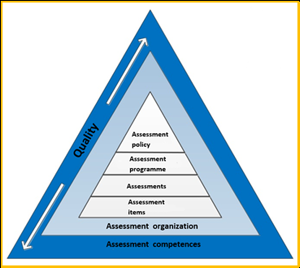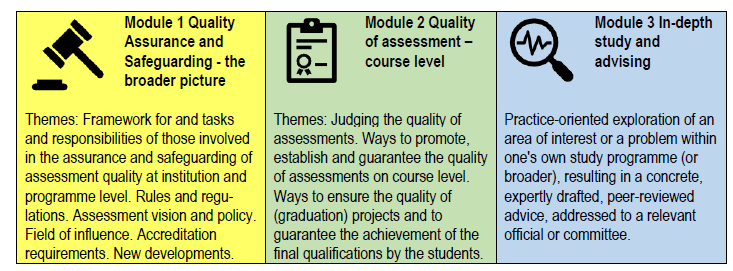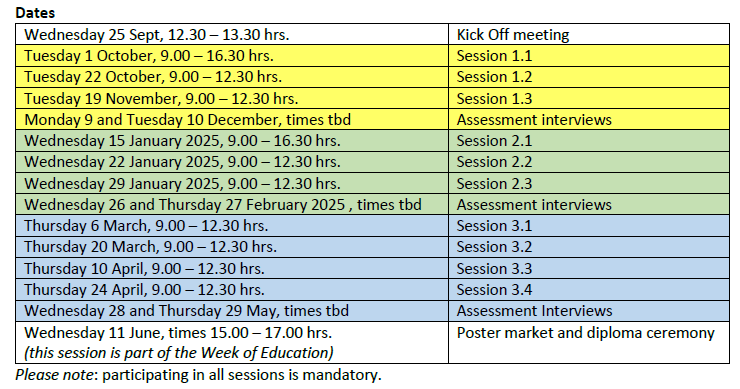The Senior University Examination Qualification trajectory (SUEQ or in Dutch Senior Kwalificatie Examinering - SKE) is a professionalisation programme for staff functioning on a senior level who, in their daily work at programme level (or higher), are involved in assuring or safeguarding the quality of assessment. This trajectory will help participants to develop knowledge and insights to influence and improve the way a programme cares for and safeguards the quality of assessment at course and programme level.
The central focus is on the organisational building blocks for assessment quality, which includes the vision on assessment, the assessment policy, the assessment programme, organisational aspects, the role and tasks of all those involved, the assessment competence of the teachers and stimulating and monitoring the quality of assessment at course level. In all these areas, measures can be taken to strengthen the quality of assessment. Hereby it is essential to be able to oversee the whole system as a coherent and dynamic entity, with cogs that can be turned to have an effect in conjunction. SUEQ certified staff members are prepared to play an essential role in this playing and force field in order to raise the quality of assessment to a higher level and to continue working on this in the future, based on their sustainable assessment competence.
THE SUEQ TRAJECTORY IN MORE DETAIL
The SUEQ trajectory in a nutshell Aim
 The SUEQ trajectory is created in line with the national SKE guidelines in its objectives and intentions, albeit with a specific university focus and set-up.
The SUEQ trajectory is created in line with the national SKE guidelines in its objectives and intentions, albeit with a specific university focus and set-up.
The aim of this trajectory is to help you develop into a senior practitioner on assessment and examination. As SUEQ practitioner, you can formulate your vision on assessment, can understand the place and function of assessment within the study programme (faculty, institution) and you have the ability to oversee, influence and improve the care for and/or safeguarding of the quality of assessment at programme (or higher) level, thereby taking the specific context into account. This not only requires thorough knowledge of the parties involved and their respective roles and responsibilities and of rules and regulations, but also an attitude that can be described as pro-active, self-critical, sensitive for the relevant context and aimed at continuously further development.
Content
The SUEQ consists of 3 main parts: 
Activities
During this trajectory you will work on various practical assignments relevant for your situation, to develop your ability to think and work at the level intended by the SUEQ and required for your position. Cases and experiences of participants will be discussed at different moments in the programme. You will meet in coach groups, guided by a CELT coach, to discuss assignments, cases and questions in more detail. In duo’s you will provide and get peer feedback on your products. Developing your vision on assessment and reflecting on your own position, functioning and professional development, is also part of the programme. Extensive supportive documentation is available via the Canvas site.
Assessment
There are assignments for each module. At the end of each module, these assignments will be assessed and you will be asked to explain your findings in a (duo) interview, provide peer feedback and show your functioning at senior level. At the end of the trajectory, the results of your in-depth study, culminating in a targeted memorandum, your vision on assessment and your reflections on your position, functioning and development, will be assessed individually. You will also be invited to share the results of your individual in-depth study to a wider audience during a poster market, at which time certificates will also be festively awarded.
What are the learning goals? The SUEQ trajectory is created in line with the national SKE guidelines in its objectives and intentions, albeit with a specific university focus and set-up. It has its origins in a programme (1) of requirements for a basic and senior qualification (BEK/SKE) for those involved in examinations in higher (vocational) education that was set up in 2013 by an expert group commissioned by the Netherlands Association of Universities of Applied Sciences. The framework and guidelines that were created by an expert group , have been strongly embraced on national level, especially within higher professional education. In 2020, the original BKE/SKE guidelines were redefined and adjusted by a committee "Je ogen uitkijken" and presented in a new report. This time also in an English version (2).
For the UT SUEQ trajectory we have formulated the following leanring goals, based on the national goals. As a SEQ practitioner:
- You are aware of the assessment framework and different roles, tasks and responsibilities within the assessment organisation. You actively contribute to the reviewing and improvement of the assurance for or safeguarding of the quality of assessment within a programme (or broader) by analysing systematically current practices. You oversee the processes at play within the assessment organisation in their interrelationship and recognise stakes and needs of those involved. You can evaluate the quality of processes within the assessment organization, especially the parts for which you are responsible, and are able to identify problem areas and come up with substantiated ideas for improvement based on acquired expertise and insight into the context.
- You actively contribute to the reviewing and improvement of the assurance for or safeguarding of the quality of assessment within a programme (or broader) by coming up with substantiated advice on a specific problem or improvement area and by communicating this advice, including an implementation plan, convincingly and effectively to a relevant body or functionary and present your ideas to a broader audience within the UT community.
- You support and guide colleagues in the assessment process and evaluate the quality of assessments. You translate the results of evaluations of assessments into concrete recommendations for an examiner, based on acquired and demonstrable assessment expertise. You give advice on design and assessment issues. In doing so, you will constantly evaluate the function of the assessments and the context in which they are used.
- As a critical professional you are able to reflect on your personal functioning and you are focused on the further development of your own competence relating to assuring or safeguarding the quality of assessment on programme level (or higher) in line with your role, tasks and responsibilities. You are able to lead and/or initiate discussions on related topics with relevant stakeholders and colleagues.
(1) Sluysmans - verantwoord toetsen rapport.pdf
(2) Dutch: Verantwoordingsdocument-Kwaliteiten-van-de-toetsbekwame-hbo-docent.pdf
English: Assessment-literacy-Qualities-of-the-assessment-literate-UAS-teachers.pdf
Is this something for you ? Target group
The SUEQ is intended in particular for staff members in higher education who, at curriculum level, have the task and responsibility of assuring or safeguarding the quality of assessment and the assessment processes and who are responsible for securing that graduates have achieved the intended final level of the degree programmes. This could be: members of an Examination Board, programme directors, programme coordinators, quality assurance officers, educational advisors and others with assessment related tasks.
Language
The language in the programme will be English, unless all participants speak Dutch.
Time investment by participants
Participating in this programme will take on average 100-120 hrs. in total, for the meetings, all assignments, the assessment interviews and the poster market.
Required prior knowledge
Basic knowledge about assessment is expected and necessary, like a UTQ or a Basic Qualification Examination (BKE) or similar. If you do not have this knowledge and want to participate, please contact the coordinators. There are possibilities to acquire this knowledge during this trajectory, but this will require some extra time.
When can I start with the SUEQ? The next SUEQ trajectory starts in September 2024.
Below an overview of the dates for the meetings.

A one-page (two sides) overview of the SUEQ trajectory, including the dates for the run in 2024/25.
Previous SUEQ in-depth projects
SIGN UP FOR THE SUEQ
To sign up for the SUEQ Trajectory, click below and follow the instructions in the Course Finder. For the 2024/25'run, please sign up before Sept 2 2024.
GET IN CONTACT
Any questions regarding the SUEQ Trajectory ? Please contact one of the SUEQ coordinators:

 The SUEQ trajectory is created in line with the national SKE guidelines in its objectives and intentions, albeit with a specific university focus and set-up.
The SUEQ trajectory is created in line with the national SKE guidelines in its objectives and intentions, albeit with a specific university focus and set-up.


